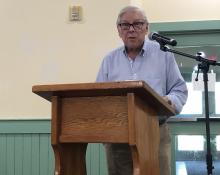He’s known as the father of universal health care in Canada, but did you know Tommy Douglas considered Mennonite mutual aid in Alberta as his model for the system?
That nugget of little-known information was shared by historian and Mennonite Historical Society of Alberta member Ted Regehr with members of the “Memories of Migration: Russlaender 100” tour on July 20 at the Ukrainian Cultural Heritage Village, located about 40 minutes east of Edmonton.
The tour had stopped at the Village to learn more about Ukrainian settlement in the province, along with interaction between Mennonites and Ukrainians in Alberta. Tour participants were joined by members of the Mennonite Historical Society of Alberta, who had come to the Village for the day.
Douglas admired the Mennonite mutual aid societies in Alberta, and “looked very seriously at them,” Regehr said.
Ultimately, he rejected that private member model believing if universal health insurance was to succeed it needed to be operated by the government for the largest public good.
During his presentation, Regehr said the mutual aid societies were one of the important ways Mennonites in the province, including the Russlaender, were able to retain a sense of closeness and identity despite being fewer in number than in Saskatchewan and Manitoba.
These mutual aid societies offered things like health, fire, storm and burial insurance, he said, along with credit unions.
The societies were important because Mennonites were “scattered more widely” in Alberta than the other prairie provinces, Regehr said.
They also filled a gap left by not being able to have their own schools or villages, like they did in Ukraine; the provincial government wouldn’t allow it.
“They didn’t have those anchor institutions of the schools” to preserve faith, language and culture, he stated.
But they did have something not found in other provinces: a representative assembly.
This assembly, Regehr said, brought together Mennonites from across the province annually to discuss issues and opportunities and talks about shared challenges.
One of those big challenges for the Russlaender was paying off the Reiseschuld (travel debt) to the Canadian Pacific Railway.
The assembly specially took on the responsibility of making sure every Russlaender family paid off their debt, Regehr said, using a mix of encouragement and shame to accomplish that goal. It also implemented a form of taxation to cover the shortfall.
Another aspect of Mennonite life in Alberta was a desire to look after people with mental illness—something not unusual considering the trauma some immigrants had experienced in the Soviet Union or during their journeys to Canada, he shared.
This took on a special urgency since anyone who became institutionalized and dependent on the government risked being deported.
“The Mennonite contract with the government was that they would look after the needs of their own members,” Regehr said.
The assembly agreed to look after people with mental illness though a mix of community and home care, he said.
As well, the assembly secured legal services for Mennonites by training people as commissioners of oaths so they could deal with the government, buy or sell real estate and perform legal transactions.
Best of all for historians, he noted, each meeting of the assembly included long and detailed reports from each Mennonite community—a boon for researchers today.
After reporting on the first leg of the tour (from Quebec City to Kitchener-Waterloo, Ont.), Winnipeg freelance writer John Longhurst is blogging about the third and final leg (from Saskatoon, Sask. to Abbotsford, B.C.).
Read John's previous posts about the tour:
MoM 100: Using technology to bring Mennonite history to life
MoM 100: Tour like a pilgrimage for young adult
MoM 100: Jews and Mennonites in the Soviet Union 100 years ago
MoM 100: Author Sarah Klassen shares about her book The Russian Daughter
MoM 100: Sängerfest in Winnipeg celebrates migration



Add new comment
Canadian Mennonite invites comments and encourages constructive discussion about our content. Actual full names (first and last) are required. Comments are moderated and may be edited. They will not appear online until approved and will be posted during business hours. Some comments may be reproduced in print.